Ruth Etting is a Actor American born on 22 november 1896 at David City (USA)
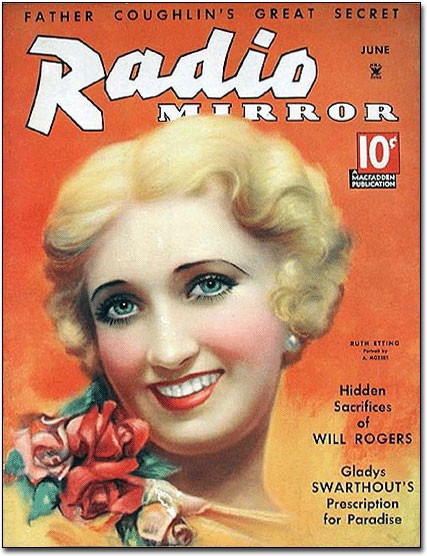
Ruth Etting (November 23, 1897 – September 24, 1978) was an American singing star and actress of the 1920s and 1930s, who had over 60 hit recordings and worked in stage, radio, and film. She is known as "America's sweetheart of song". Her signature tunes were "Shine On, Harvest Moon", "Ten Cents a Dance" and "Love Me or Leave Me". Her other popular recordings included "Button Up Your Overcoat", "Mean to Me", "Exactly Like You" and "Shaking the Blues Away".
As a young girl, Etting had wanted to be an artist; she drew and sketched everywhere she was able. At sixteen, her grandparents decided to send her to art school in Chicago. While Etting attended class, she found a job at the Marigold Gardens nightclub; after a short time there, Etting gave up art classes in favor of a career in show business. Etting, who enjoyed singing in school and church, never took voice lessons. She quickly became a featured vocalist at the club. Etting was then managed by Moe Snyder, whom she married in 1922. Snyder made arrangements for Etting's recording and film contracts as well as her personal and radio appearances. She became nationally known when she appeared in Ziegfeld's "Follies of 1927".
Etting intended to retire from performing in 1935, but this did not happen until after her divorce from Snyder in 1937. Harry Myrl Alderman, Etting's pianist, was separated from his wife when he and Etting began a relationship. Moe Snyder did not like seeing his former wife in the company of other men and began making telephone threats to Etting in January 1938. By October, Snyder traveled to Los Angeles and detained Alderman after he left a local radio station; he forced the pianist to take him to the home of his ex-wife at gunpoint. Saying he intended to kill Etting, Alderman, and his own daughter, Edith, who worked for Etting, Snyder shot Alderman. Three days after Alderman was shot, his wife filed suit against Etting for alienation of affections.
While Alderman and Etting claimed to have been married in Mexico in July 1938, Alderman's divorce would not be final until December of that year. The couple was married during Moe Snyder's trial for attempted murder in December 1938. Etting and Alderman relocated to a farm outside of Colorado Springs, where they were primarily out of the spotlight for most of their lives. Etting's fictionalized story was told in the 1955 film Love Me Or Leave Me with Doris Day as Ruth Etting.
Etting was interested in drawing at an early age and hoped to be able to draw illustrations for a newspaper. She drew and sketched anywhere she was able. Her grandparents were asked to buy the textbooks she had used at the end of a school term because Etting had filled them with her drawings. She left David City at the age of sixteen to attend art school in Chicago. Etting got a job designing costumes at the Marigold Gardens nightclub, which led to employment singing and dancing in the chorus there.She gave up art school soon after going to work at Marigold Gardens. Before turning exclusively to performing, Etting also worked as a designer for the owner of a costume shop in Chicago's Loop; she was successful enough to earn a partnership in the shop through her work. While she enjoyed singing at school and in church, Etting never took voice lessons. She said that she had patterned her song styling after Marion Harris, but created her own unique style by alternating tempos and by varying some notes and phrases. Describing herself as a "high, squeaky soprano" during her days in David City, Etting developed a lower range singing voice after her arrival in Chicago which led to her success. Her big moment came when a featured vocalist suddenly became ill and was unable to perform. With no other replacement available, Etting was asked to fill in. She quickly changed into the costume and scanned the music arrangements; the performer was male, so Etting tried to adjust by singing in a lower register.
Etting became a featured vocalist at the nightclub, and married gangster Martin "Moe the Gimp" Snyder on July 17, 1922 in Crown Point, Indiana. Etting described herself as a young, naive girl when she arrived in Chicago. Because of her inexperience in the ways of the big city, she became reliant on Snyder after their meeting. Etting and Snyder met in 1922, when she was performing at the Marigold Gardens. Snyder, who divorced his first wife to marry Etting, was well-acquainted with Chicago's nightclubs and the entertainers who worked in them; he once served as a bodyguard to Al Jolson. She later said she married him "nine-tenths out of fear and one-tenth out of pity." He managed her career, booking radio appearances and eventually had her signed to an exclusive recording contract with Columbia Records.
She made her Broadway debut in the Ziegfeld Follies of 1927; Irving Berlin had recommended her to showman Florenz Ziegfeld. Etting nervously prepared to sing for Ziegfeld at the audition. However, he did not ask her to sing at all; only to walk up and down the room. She was hired on that basis because Ziegfeld did not hire women with big ankles. While the original plan for the show was for Etting to do a tap dance after singing "Shaking the Blues Away", she later remembered she was not a very good dancer. At the show's final rehearsal, Flo Ziegfeld told her, "Ruth, when you get through singing, just walk off the stage". Etting also appeared in Ziegfeld's last "Follies" in 1931.
She went on to appear in a number of other hit shows in rapid succession, including Simple Simon and Whoopee!. In Hollywood, Etting made a long series of movie shorts between 1929 and 1936, and three feature movies in 1933 and 1934. She described the short films as either having a simple plot to allow for her to sing two songs or with no plot at all. The idea was to have Etting sing at least two songs in the film. While she received a marquee billing for Roman Scandals, Etting had only two lines in the film and sang just one song. Etting believed she might have had more success in full-length films if she had been giving some acting lessons. Her perception was that the studios viewed her only as a vocalist. She later recalled, "I was no actress, and I knew it. But I could sell a song". In 1936, she appeared in London in Ray Henderson's Transatlantic Rhythm. Etting also had her own twice weekly 15 minute radio show on CBS in the 1930s. By 1934, she was on NBC with sports announcer Ted Husing doing the announcing and Oldsmobile sponsoring her program.
Source : Wikidata
Ruth Etting

Nationality USA
Birth 22 november 1896 at David City (USA)
Death 24 september 1978 (at 81 years) at Colorado Springs (USA)
Birth 22 november 1896 at David City (USA)
Death 24 september 1978 (at 81 years) at Colorado Springs (USA)
As a young girl, Etting had wanted to be an artist; she drew and sketched everywhere she was able. At sixteen, her grandparents decided to send her to art school in Chicago. While Etting attended class, she found a job at the Marigold Gardens nightclub; after a short time there, Etting gave up art classes in favor of a career in show business. Etting, who enjoyed singing in school and church, never took voice lessons. She quickly became a featured vocalist at the club. Etting was then managed by Moe Snyder, whom she married in 1922. Snyder made arrangements for Etting's recording and film contracts as well as her personal and radio appearances. She became nationally known when she appeared in Ziegfeld's "Follies of 1927".
Etting intended to retire from performing in 1935, but this did not happen until after her divorce from Snyder in 1937. Harry Myrl Alderman, Etting's pianist, was separated from his wife when he and Etting began a relationship. Moe Snyder did not like seeing his former wife in the company of other men and began making telephone threats to Etting in January 1938. By October, Snyder traveled to Los Angeles and detained Alderman after he left a local radio station; he forced the pianist to take him to the home of his ex-wife at gunpoint. Saying he intended to kill Etting, Alderman, and his own daughter, Edith, who worked for Etting, Snyder shot Alderman. Three days after Alderman was shot, his wife filed suit against Etting for alienation of affections.
While Alderman and Etting claimed to have been married in Mexico in July 1938, Alderman's divorce would not be final until December of that year. The couple was married during Moe Snyder's trial for attempted murder in December 1938. Etting and Alderman relocated to a farm outside of Colorado Springs, where they were primarily out of the spotlight for most of their lives. Etting's fictionalized story was told in the 1955 film Love Me Or Leave Me with Doris Day as Ruth Etting.
Biography
Etting was born in David City, Nebraska in 1897 to Alfred, a banker, and Winifred (née Kleinhan) Etting. Her mother died when she was five years old and she then went to live with her paternal grandparents, George and Hannah Etting. Her father remarried and moved away from David City and was no longer a part of his daughter's life. Etting's grandfather, George, owned the Etting Roller Mills; to the delight of his granddaughter, Etting allowed traveling circuses and shows to use the lot behind the mills for performances.Etting was interested in drawing at an early age and hoped to be able to draw illustrations for a newspaper. She drew and sketched anywhere she was able. Her grandparents were asked to buy the textbooks she had used at the end of a school term because Etting had filled them with her drawings. She left David City at the age of sixteen to attend art school in Chicago. Etting got a job designing costumes at the Marigold Gardens nightclub, which led to employment singing and dancing in the chorus there.She gave up art school soon after going to work at Marigold Gardens. Before turning exclusively to performing, Etting also worked as a designer for the owner of a costume shop in Chicago's Loop; she was successful enough to earn a partnership in the shop through her work. While she enjoyed singing at school and in church, Etting never took voice lessons. She said that she had patterned her song styling after Marion Harris, but created her own unique style by alternating tempos and by varying some notes and phrases. Describing herself as a "high, squeaky soprano" during her days in David City, Etting developed a lower range singing voice after her arrival in Chicago which led to her success. Her big moment came when a featured vocalist suddenly became ill and was unable to perform. With no other replacement available, Etting was asked to fill in. She quickly changed into the costume and scanned the music arrangements; the performer was male, so Etting tried to adjust by singing in a lower register.
Etting became a featured vocalist at the nightclub, and married gangster Martin "Moe the Gimp" Snyder on July 17, 1922 in Crown Point, Indiana. Etting described herself as a young, naive girl when she arrived in Chicago. Because of her inexperience in the ways of the big city, she became reliant on Snyder after their meeting. Etting and Snyder met in 1922, when she was performing at the Marigold Gardens. Snyder, who divorced his first wife to marry Etting, was well-acquainted with Chicago's nightclubs and the entertainers who worked in them; he once served as a bodyguard to Al Jolson. She later said she married him "nine-tenths out of fear and one-tenth out of pity." He managed her career, booking radio appearances and eventually had her signed to an exclusive recording contract with Columbia Records.
She made her Broadway debut in the Ziegfeld Follies of 1927; Irving Berlin had recommended her to showman Florenz Ziegfeld. Etting nervously prepared to sing for Ziegfeld at the audition. However, he did not ask her to sing at all; only to walk up and down the room. She was hired on that basis because Ziegfeld did not hire women with big ankles. While the original plan for the show was for Etting to do a tap dance after singing "Shaking the Blues Away", she later remembered she was not a very good dancer. At the show's final rehearsal, Flo Ziegfeld told her, "Ruth, when you get through singing, just walk off the stage". Etting also appeared in Ziegfeld's last "Follies" in 1931.
She went on to appear in a number of other hit shows in rapid succession, including Simple Simon and Whoopee!. In Hollywood, Etting made a long series of movie shorts between 1929 and 1936, and three feature movies in 1933 and 1934. She described the short films as either having a simple plot to allow for her to sing two songs or with no plot at all. The idea was to have Etting sing at least two songs in the film. While she received a marquee billing for Roman Scandals, Etting had only two lines in the film and sang just one song. Etting believed she might have had more success in full-length films if she had been giving some acting lessons. Her perception was that the studios viewed her only as a vocalist. She later recalled, "I was no actress, and I knew it. But I could sell a song". In 1936, she appeared in London in Ray Henderson's Transatlantic Rhythm. Etting also had her own twice weekly 15 minute radio show on CBS in the 1930s. By 1934, she was on NBC with sports announcer Ted Husing doing the announcing and Oldsmobile sponsoring her program.
Usually with
Filmography of Ruth Etting (8 films)
Actress
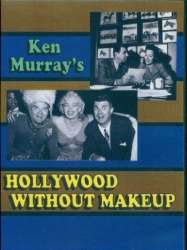
Hollywood Without Make-Up (1963)
Directed by Ken Murray
Origin USA
Genres Documentary
Themes Documentary films about business, Documentary films about the film industry, Documentary films about cities
Actors Kirk Douglas, Ken Murray, Cary Grant, June Allyson, George K. Arthur, Eddie Albert
Roles Self (archive footage)
Rating71%





The film consists of archive footage of famous Hollywood stars, mostly home movies showing the stars as themselves instead of playing a role in front of the camera.

One Good Turn (1955)
, 1h30Directed by John Paddy Carstairs
Origin United-kingdom
Genres Comedy
Actors Ruth Etting, Norman Wisdom, Joan Rice, William Russell, Dame Thora Hird, Richard Caldicot
Rating64%





Norman vit toujours dans l'orphelinat Greenwood où il a grandi et où il est devenu un employé. Un matin, alors qu'il emmène les orphelins à l'école, ils s'arrêtent devant un magasin de jouets où une voiture à moteur impressionne les enfants, et plus particulièrement le petit Jimmy. Arrivé à l'école, Norman laisse les enfants aux bons soins d'Iris Gibson, leur professeur, mais aussi l'objet de l'affection de Norman. Mais elle s'intéresse plutôt à Alec Bigley , le fils du propriétaire du terrain sur lequel l'orphelinat est construit. En fait, c'est Mary, une autre employée, qui se languit de Norman, alors qu'il ne la remarque pas.

Melody in May (1936)
, 20minutesDirected by Ben Holmes
Origin USA
Genres Musical
Themes Musical films
Actors Ruth Etting, Frank Coghlan, Jr., Dorothy Short, Eva McKenzie
Roles Herself
Rating58%





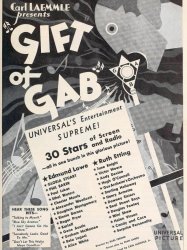
Gift of Gab (1934)
, 1h10Directed by Karl Freund
Origin USA
Genres Comedy, Musical
Themes Musical films
Actors Edmund Lowe, Gloria Stuart, Ruth Etting, Ethel Waters, Alice White, Paul Lukas
Roles Ruth
Rating49%





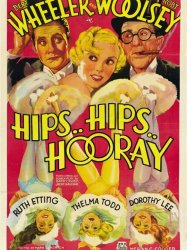
Hips, Hips, Hooray! (1934)
, 1h8Directed by Mark Sandrich
Origin USA
Genres Comedy, Romantic comedy, Musical, Romance
Themes Musical films
Actors Robert Woolsey, Bert Wheeler, Ruth Etting, Thelma Todd, Dorothy Lee, True Eames Boardman
Roles Ruth Etting
Rating63%





Todd stars as Amelia Frisby, the owner of a beauty supply business. Andy Williams (Wheeler) and Dr. Bob Dudley (Woolsey) convince her to hire them as salesman to promote her new flavored lipstick, and hilarity ensues. The film features Etting singing "Keep Romance Alive" and Bert Wheeler and Dorothy Lee singing "Keep On Doin' What You're Doin'" by Bert Kalmar and Harry Ruby.

Mr. Broadway (1933)
, 1h3Directed by Edgar George Ulmer, Johnnie Walker
Origin USA
Genres Comedy, Documentary
Actors Ed Sullivan, Jack Benny, Ruth Etting, Lita Grey, Hal Le Roy, Jack Haley
Roles Ruth Etting
Rating61%





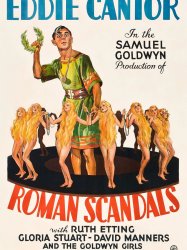
Roman Scandals (1933)
, 1h33Directed by Frank Tuttle, Frank Tuttle
Origin USA
Genres Comedy, Musical
Themes Films set in Africa, Musical films
Actors Eddie Cantor, Ruth Etting, Gloria Stuart, David Manners, Edward Arnold, Verree Teasdale
Roles Olga
Rating65%





When kind-hearted delivery boy and self-acclaimed authority on ancient Rome Eddie (Eddie Cantor) is thrown out of his home-town of West Rome, Oklahoma by scheming and corrupt politicians he protests that nothing of the sort would have been allowed to happen in ancient Rome. On his way out of town he imagines that he is back in Imperial Rome, where he is sold in a slave market to good-natured tribune Josephus (David Manners). Eddie soon discovers that Roman society was just as corrupt as in his own town and when he decides to do something about it he becomes involved in court intrigue and a murder plot against the evil Emperor Valerius (Edward Arnold) himself.

Blue Songs (1929)
Directed by Joseph Santley
Origin USA
Genres Musical
Themes Musical films
Actors Ruth Etting
 Connection
Connection



